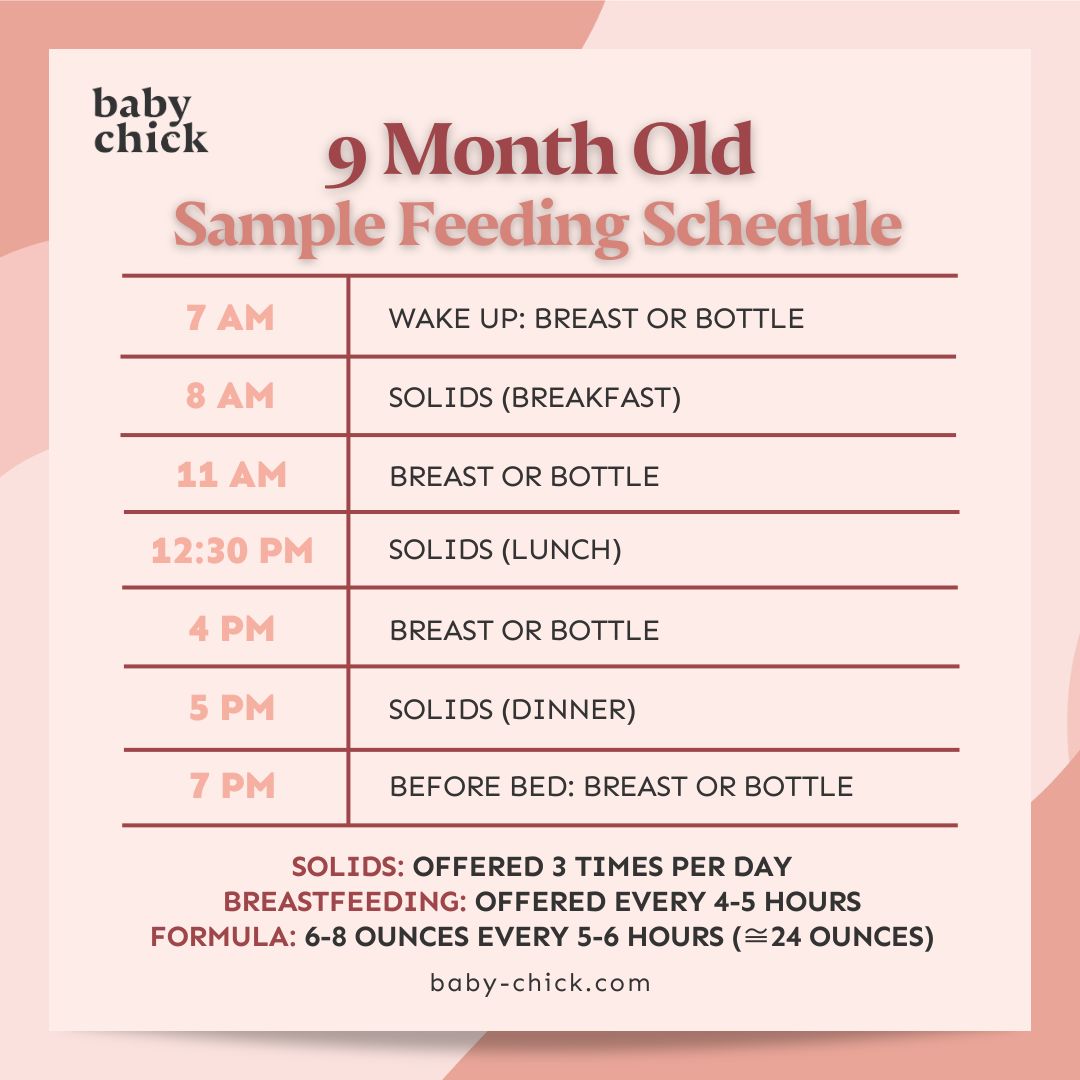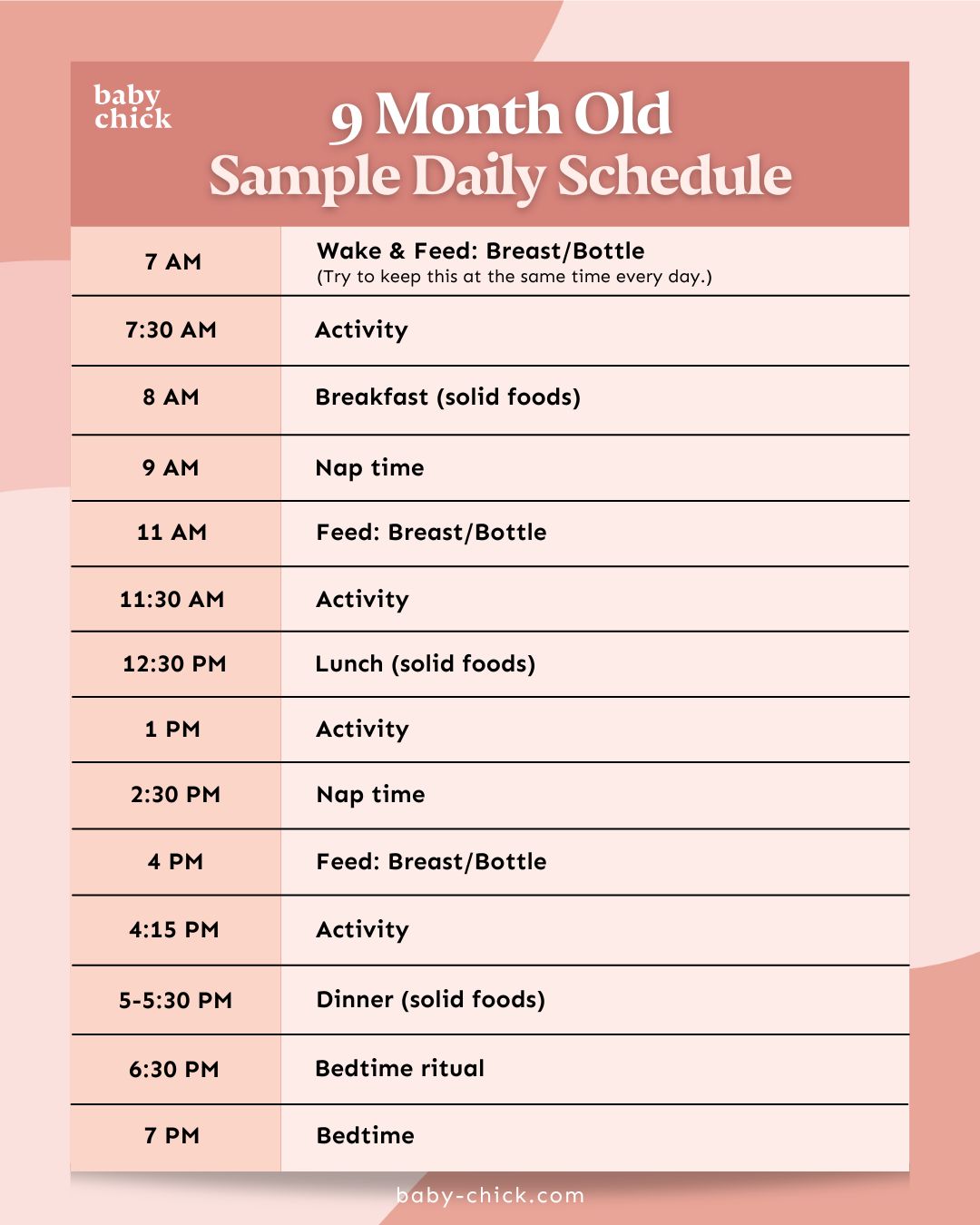Get ready — this next month of development will be a loud one! At 9 months old, your baby will experience more vocal growth in their developmental milestones, and they’ll love to engage with the people around them. This article will cover all their new developmental milestones, along with their feeding schedule, a sample sleep schedule, and fun ways for you to engage with your 9-month-old baby. We’ll also explore how much a 9-month-old should weigh, whether they may experience sleep regression, and when their wake window is. So, let’s dive in!
9-Month Developmental Milestones
If there’s one word to describe your baby’s upcoming development, it’s “noise!” During this time, they’ll start to find their voice and let you know it. Your 9-month-old’s new and exciting milestones include:1
- Being shy, clingy, and fearful around new people
- Showing various emotions like happiness, anger, and sadness
- Responding to their name
- Making various nonspecific sounds (i.e., babbling), including consonants
- Banging two objects together
- Lifting their arms and making noise to be picked up
- Getting to a sitting position unassisted and sitting without support
- Raking objects toward themselves with their fingers/hands
9-Month-Old Feeding Schedule

At 9 months old, your baby’s appetite continues to grow. Your 9-month-old’s feeding schedule will follow the breakfast, lunch, and dinner schedule of their caregivers. Their portion sizes will also increase.2 Breast milk and formula will continue to provide most of their nutrients; however, consuming a wide variety of fruits, vegetables, pasteurized dairy, and proteins will provide them with extra nutrients.2
Offer foods that are easy to eat, like purees, mashed foods with a few lumps, and soft-cooked veggies. This will help baby gain confidence with differing textures.2 Giving them iron-fortified baby cereals is also a great option, but only add the cereal to your baby’s bottle if your doctor directs you to do so.3
To monitor your baby for any food allergies, only introduce one new food at a time and wait a few days before introducing another. This gives you time to notice if baby has any food allergy symptoms. Signs they may be having a food reaction include:3
- Rash
- Diarrhea/vomiting
- Trouble breathing
- Hives
If your baby is experiencing trouble breathing, seek immediate medical attention.
Contrary to popular belief, introducing high-allergen foods early in your baby’s life will not increase the likelihood of them developing food allergies. Introducing high-allergen foods such as wheat, soy, peanuts, eggs, milk, and nuts is safe as long as you monitor your infant for any allergic reactions.3
While many babies can consume a wide range of food, certain foods should be avoided, including:3
- Foods with added sugar or no-calorie sweeteners
- High-sodium foods
- Honey and any foods containing honey
- Unpasteurized juice or dairy products
- Choking hazards such as hot dogs, uncooked carrots, grapes, popcorn and nuts
9-Month-Old Sleep Schedule

Your 9-month-old’s sleep pattern will continue to follow the sleep pattern they previously had. They still need 12-16 hours of sleep daily and typically take two daily naps, averaging three to four hours total.4 However, your 9-month-old may experience another sleep regression period. Sleep regression is a change in your infant’s sleeping pattern, including difficulty going back to sleep or staying asleep. Baby may start napping for shorter periods, become increasingly fussy, or change their appetite. Sleep regression lasts two to six weeks on average.5
Here are the common causes of sleep regression:5
- Pain from teething
- Reaching a new developmental milestone
- A growth spurt
- A change in their routine
- Travel
- Illness
Sleep regression is difficult for parents and babies alike, but there are ways to overcome it with your 9-month-old. These include:5
- Keeping a consistent bedtime and nap routine
- Recognizing your baby’s sleep cues and putting them to bed at the first sign of tiredness
- Allowing baby a few minutes of fussiness before responding when they awaken at night
Daily Schedule

During this time of sleep regression, it’s essential to maintain a predictable daily schedule. Your 9-month-old will still take two naps daily, split between morning and afternoon, and have wake windows of around two to three hours each.6 Each baby’s naptimes and bedtimes look different depending on their individual needs, but a sample sleep schedule for a 9-month-old can help you develop your own. Here’s an example:6
- 7-7:30 a.m. — Wake up for the day.
- 9-9:30 a.m. — Have the first nap of the day, which should last one to two hours.
- 2-2:30 p.m. — Have the second nap of the day. It should also last one to two hours.
- 7-8 p.m. — Do their bedtime routine and go to bed.
Allowing baby to nap later than 4 p.m. can make it difficult for them to fall asleep at night. So, aim for a bedtime 10-12 hours before your baby typically awakens for the day. This will help baby get enough sleep.6
Health Concerns to Watch Out For
A regular check-up is recommended at 9 months of age, as this is an important visit for checking weight and milestones and answering parents’ questions. There usually aren’t any routine vaccines for your 9-month-old besides their annual flu vaccine. This vaccine is recommended for any baby over 6 months old during the cold and flu season. It should be given before the end of October to protect your baby from the flu.7
Many parents wonder how much their 9-month-old should weigh. On average, a 9-month-old boy will weigh between 17 and 25 pounds, while a 9-month-old girl will weigh between 15 and 23 pounds.8 Remember, each baby grows at their own pace, but if you’re concerned about their growth, don’t hesitate to contact their pediatrician.
Monitoring your child for common childhood illnesses they may catch is essential. These illnesses include:9
- Colds with a runny nose, sneezing, congestion, and cough
- Diarrhea and vomiting caused by viruses
- Ear infections
- Hand-foot-mouth disease, where sores develop in the mouth, palms of the hands, and soles of the feet
It’s vital to seek medical attention for baby if they start to experience any of the following symptoms:9
- Fever lasting longer than three days
- Ear pain
- Difficulty breathing
- Change in attitude, such as increased irritability or lethargy
- Dehydration (cracked lips, decreased wet diapers, and decreased tears)
Activities for 9-Month-Olds

During this time, baby will continue to grow their personality; the best way for them to do that is by interacting with their parents. They will start to copy and mimic you, which gives you many opportunities to teach them sounds and language. Some ways you can do that are:10,11
- Sing fun songs and include actions or sounds for baby to mirror
- Provide toys in various shapes, sizes, colors, and textures and ones that make noise as they’re interacted with
- Play peek-a-boo
- Place a toy just out of baby’s reach and encourage them to grab it
- Read to your baby daily
Safety Tips
Safety is always important for parents, but never more than when their baby becomes mobile. Providing baby with a safe place to play and explore is crucial. You can achieve this by:12,13
- Removing small objects that can be easily swallowed from their reach
- Placing gates on stairways or in doorways of rooms you don’t want them going into
- Placing window guards on all windows, not just the ones above the first floor
- Moving their crib away from any windows
- Keeping hot foods and beverages out of their reach
- Not leaving them unattended in the bathtub
Now that your baby has found their voice and their personality is blossoming, the fun won’t stop! They will continue to grow and thrive, and you will continue to be amazed by their new skills.
































